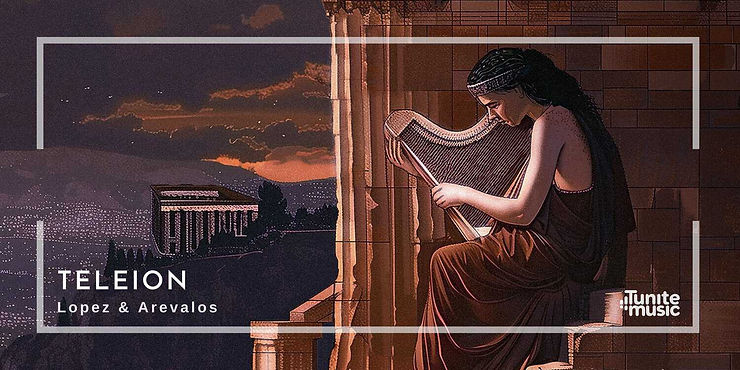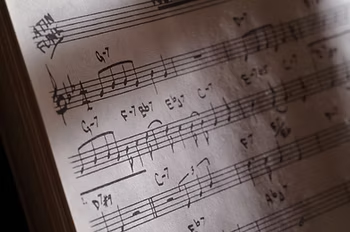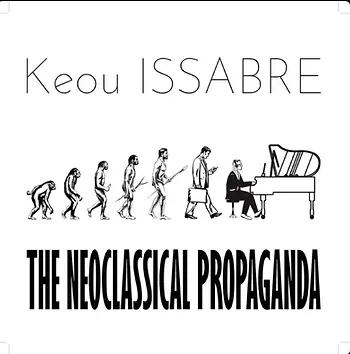
I
TELEION as a perfect circle, that before revealing its absolute perfection, uniting the point of the beginning with the end, ranges and embraces all the human expressions of life, to draw the pain, the hope or the anguish, and during this trajectory becomes aware about the limitations of the human nature in front of the divine which is above and appears to it unattainable.TELEION. And it is truly strange how the human being, the Homeric βροτός, incomplete and consumable, destined for the death, manages to reach the harmony of the universe with the music and the poetry, the dance and the mimicry, and make peace with the limits of the human nature, the defects, the weaknesses.
II
TELEION is a collection of hymns, songs, breaths, which have resisted the wear of time, escaped the destructive indifference of the man and have been preserved in fragile papyrus or carved on the stone exposed to the adverse weather, the rain, the scorching sun that erases every trace; for this reason many writings appear fragmentary, even if the careful work of philologists has filled some gaps and recovered verses that were definitely destroyed.
III
Papyrus is fragile and suffers from humidity and mold which can blacken its surface, it suffers from the sudden changes of the temperature which can crumble the stems into thin strips, woven by the delicate women’s and children’s fingers; a luckier destiny, however, had those that are used in funerary rituals, placed in tombs to provide guidance to the deceased in the afterlife, as happened with the PAPyrus. VIENNA G twenty three – fifteen (2315), which was used as packaging material for a mummy;
in this arid environment, was preserved a fragment from the Euripides’ tragedy of Orestes with musical notation for both, the performance instruments and the voice, but the plaster that joined the pieces of papyrus, when detached, took with it, in oblivion, a part of the black ink characters.
IV
Papyrus, in antiquity, was an expensive material and every single inch was treated with frugality. It is not strange, therefore, that the myth of Ajax of the Papyrus BERLIN sixty eight – seventy (6870) lies on the back page of a military document. That belongs to the Tragic Adespota, which is the collection without reference to the original author’s name. On the back page of the bureaucratic military text, there is the lyrical dialogue between Tecmessa, the Ajax’s concubine, and the choir, composed of only women, when news arrived regarding the death of Ajax, who became mad at the behest of the goddess Athena and killed himself. The legend is taken up several times in Greek literature but philologists agree on the uniqueness of the text: we have in our hands a later arrangement for a concert performance by a female singer, even if in the original tragic performance all female parts would have been played by male actors.
V
In the Mediterranean the stone, the clay and the white marble quarries abound. And as the biblical phrase of the Genesis “flesh of my flesh”, the stone has been the main material for the construction of palaces, theaters, temples, and next to them, perhaps in front of their entrances, in the main streets, sanctuary marble or stone slabs were raised to warn, celebrate, or the funerary ones, outside the city walls, to guarantee the existence of the memory through time.
In this collection, therefore, are remembered two sanctuary inscriptions: the Paean of Athenaios and the Paean of Limenios which were found on the south outer wall of the Athenian treasury at Delphi. The framework in both cases consists of an invocation of the Muses, the epiphany of Apollo, the sacrifice, a recital of the god’s wondrous deeds, and concluding prayers. The Limenios’ Paean expands the traditional framework with the story of the god’s birth, the building of the temple, and the Tityos episode.
VI
In the south the sun rises higher to surpass the impetuous mountains that overlook the few valleys. All the bristling stones or those which rest on the dust, tell stories of deeds of men who are no longer there; words that the wind carries, that caresses the rain, that falls rarely on the ground; sometimes, a hand picks them up and puts them under the shade and they stop their storytelling, they become gray and gloomy: in fact, various inscriptions have been recycled for the construction of buildings or to decorate their interiors: this is, indeed, the fate of the Seikilos inscription from the 2nd century A.D., which was initially found during the construction of a railway in the neighborhood of Aydin, and entered the private collection of the building firm’s director. As the pillar was broken at the bottom, its base was sawn off straight so that it could stand and serve as a pedestal for the director’s wife’s flowerpots.
On the inscription is read:
As long as you live, show yourself to the world, [shine]
you have not to suffer;
life does not last long;
time demands its tribute.
Why did Seikilos prefer to write such a warning as a testament for us? What could be his deepest anguish, if thinking that these verses were probably written shortly before his death, as often happens also to modern poets, in which the last compositions, as a premonition for the physical end, they talk about the profound meaning of life? From what danger did Seikilos protect us? From what voracious phallus into which men fall, as if it were a trap with no way out? And why did he feel the need to share his personal truth with us? On what occasions was this song sung and its rhythm performed? by himself or by another singer? And what impressions did it arouse? How did the spectators receive his words?
VII
And it is very strange that in this collection, by pure chance, on how to seize the moment, the life, the months that pass quickly, there is the first choral of Euripides’ Orestes which illuminates the words of Seikilos:
the great happiness
is not long-lasting to the mortals;
it is as the sail of a fast ship which
got shattered and sunk by a God with terrible pains
between the greedy and voracious
waves of the sea.
VIII
After all, what is the human if not in the Pindar’s verse σκιᾶς ὄναρ ἄνθρωπος “men are the dream of a shadow” and how this classic vision persists in world literature, if we think of Shakespeare’s verse taken from Macbeth “Life’s but a walking shadow”.
And now we have arrived after a long odyssey, at an inviting and pleasant bay: that’s the importance of the ancient literary tradition: its diachronic universal character through the centuries. How similar the ancient people are to us. The years that have passed act as a mirror that reflects the same human passions, fears, hopes, delusions; the further away we are, the more we are able to see the whole picture in a complete way.
IX
Come, càrpete diem, come, with thoughtfulness, with devotion, until there is still day and the god Apollo marks the celestial vault with his chariot. Please do come and listen, now that the blessed goddess, winged Nemesis, who turns the scales of life, is benevolent to us.
X
I invite you to listen to these ancient voices, as the lesbian poetess Sappho of sixth century a.C. the Cretan dancers:
with delicate feet,
with light steps,
around the loving altar
gently trample on the grass flowers.
Δημήτρης Σούκουλης (Dimitris Soukoulis)
#TELEION #LopezAndArevalos #GreekMusic #AncientGreece #ContemporaryClassicalMusic #ContemporaryMusic #AncientMusic #ClassicalMusic #ΔημήτρηςΣούκουλης #DImitrisSoukoulis







